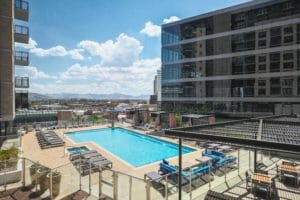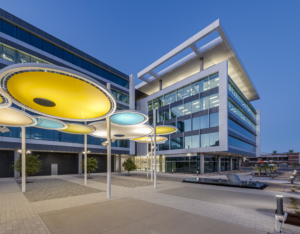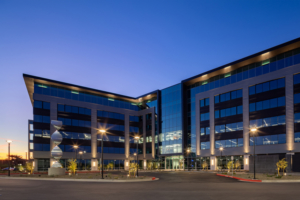Arizona State University’s campus ahead of the class for sustainable innovation
Sustainability has become a top priority for new architectural developments in Arizona. Architects understand the necessity of sustainably efficient buildings for these changing times.
Not only do these building save money and resources, but pave the future’s way with minimal environmental harm. In other words, sustainable buildings fulfill both short and long-term requirements for the most effective architecture.
Arizona State University’s campus prides itself in sustainable innovation. With accelerated actions and transformative approaches, ASU serves as a representative of what modern architecture should be.
The university runs all campus activities in an environmentally-conscious manner, and achievements are continually recognized as being top of the line.
Every newly constructed ASU building since 2005 has been certified LEED Silver or higher. Currently, the school has 36 LEED Silver or better certified buildings. The Biodesign Institute in Tempe is the first LEED Platinum certified building in Arizona.
“There’s a governor’s executive order that mandates that we install buildings that achieve at least LEED Silver,” says David Brixen, vice president of Facilities Development and Management at ASU. “But in addition to that, our president made the same commitment that it’s our goal for every building to achieve LEED Silver. In many cases, we’ve exceeded that.”
 The Princeton Review recently named ASU one of the nation’s “greenest” universities, along with giving the highest number of Green Rating tallies. Just 16 other universities obtained this perfect score.
The Princeton Review recently named ASU one of the nation’s “greenest” universities, along with giving the highest number of Green Rating tallies. Just 16 other universities obtained this perfect score.
ASU is also ranked in the top 25 of SIERRA magazine’s “Coolest Schools” as one of the greenest campuses in the nation.
Additionally, the university was one of just 22 institutions out of 117 to receive a STARS® Gold rating from the Association for the Advancement of Sustainability in Higher Education (AASHE).
“The most effective and the most important sustainability project on our campus is solarization,” Brixen says.”
Solar panel systems have been installed at various locations on multiple campuses. More than 50 sites now have these solar systems. More than 13 megawatts of systems are currently established, with 16 soon to come as a result of construction on the Polytechnic Campus. The goal is to eventually reach 20 megawatts.
ASU also excels in recycling and waste reduction.
“We have lofty goals in our recycling program as well,” Brixen says. “We have a goal to be ‘zero solid waste’ by 2015. The students will play a major role in going forward and achieving that success.”
Accomplishments range from recycling plans so successful that recycling receptacles are emptied more frequently than trash, to a composting program that turns landscaping waste into useful mulch. ASU dining strives to be sustainable through tray-less meals and recyclable products.
Sustainability is not only a practice at ASU, but a lifestyle.
“We expect all staff members to be active participants in sustainability at work,” Brixen explains.
The Sustainability Literacy Education online program was launched last year. This interactive program is available to everyone in the ASU community. It provides examples of sustainable practices at ASU, the university’s sustainable goals, and how to engage in sustainable support at the school. This program also provides facts on sustainability to employees in order to help them fulfill their yearly work-performance evaluations. Completion certificates have been awarded to 243 employees to date.
ASU understands the importance of sustainable building for the future, and continues to influence other establishments in terms of solar energy innovation. The community benefits from the university’s environmentally-conscious practices.
“When they see it, they’re impressed with how far we’ve come with solar energy,” Brixen said. “We’ve played a significant leadership role in the solar movement in Arizona.”
Brixen hopes to see sustainable attitudes trickle down to the student body, since their influence is imperative to the university’s future. The university’s School of Sustainability is the first in the nation. Here, students earn bachelor’s, master’s and doctoral degrees and apply their knowledge to help global issues.
“Sustainability has been engrained into the university’s culture now,” Brixen says. “It’s important for the university to walk the talk.”
With national recognition for sustainable practices, a School of Sustainability and solar power innovation, ASU has achieved enormous success in keeping up with the environment’s needs. Its goal is to be “carbon neutral” by 2015 — meaning, no waste will be left behind.



